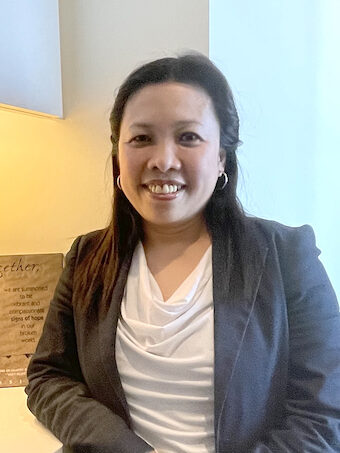Gladys Hrabi, a former social worker who’s now the Executive Director of the Interfaith Health Care Association of Manitoba since 2024, believes that spiritual health is a main pillar of care across health and human services. “If we’re ever talking about whole person care, what we’re talking about is spiritual health,” she explains. “There’s a hunger for meaning, purpose and connection that we all have, and when things are hard, that hunger only grows.”
Spiritual Health Awareness Week, which took place October 20 to 26th, is a chance to celebrate and uplift the important ways we honour the people we care for in our organizations. “Spiritual health can look like many different things,” Hrabi continues. “For some, it’s an expression of faith, but for others, it might be art, or their community, or their family. Finding meaning is important and any ways that someone can do that counts as caring for our spiritual health.”
She believes that in modern times, as faith traditions evolve, the need for spiritual care is larger than ever. “There’s research to say that 37% of people now are saying they’re spiritual but not religious,” shares Hrabi. “So there are many ways to care for the whole person that need to be considered, whether that’s nature or visual art or music.”

In fact, one of Hrabi’s favourite examples of spiritual health is the use of music in long term care communities. “For people with dementia or cognitive impairment, music speaks to them in ways that other modalities can’t,” she continues. “If that means someone can express some meaning, purpose and joy, then that matters.”
Spiritual health isn’t strictly the domain of patients; Hrabi shares that in complex care environments, staff need support, as well. “They’re experiencing burnout and moral distress, where they’re faced with difficult situations and have to make hard decisions,” she says. “They might wonder if they’re in the right career, or have the right skills to deal with challenging situation They need support, too. Which reminds us that we are all spiritual health providers. We’re not just here to treat people in health care, we’re here to heal people. So we can all be that for each other, we can hold space for others to have hope and meaning in their lives.”
Spiritual Health Awareness Week highlights the need for more and improved care across the country. “This isn’t an add-on, a ‘good to have’ addition to health care,” confirms Hrabi. “It’s a must. It has to be integrated into every facet of our health care systems, if we want to be able to deliver and receive person-centred care. And the data backs up that patient outcomes improve when their spiritual health is considered.”
Advocates for spiritual health services also chose this week to highlight the ways that professionalization can support compassionate care. “We can certainly see a doctor for anything generic, but if we have heart problems, we’ll go see a cardiologist,” says Hrabi. “If we need special care for our spirit because we’re facing a health challenge, why wouldn’t we have someone trained specifically to do that? We have to provide practitioners with the tools to be able to be with people who are in distress or losing hope. This is such an important field, and one worth highlighting all year round.”

